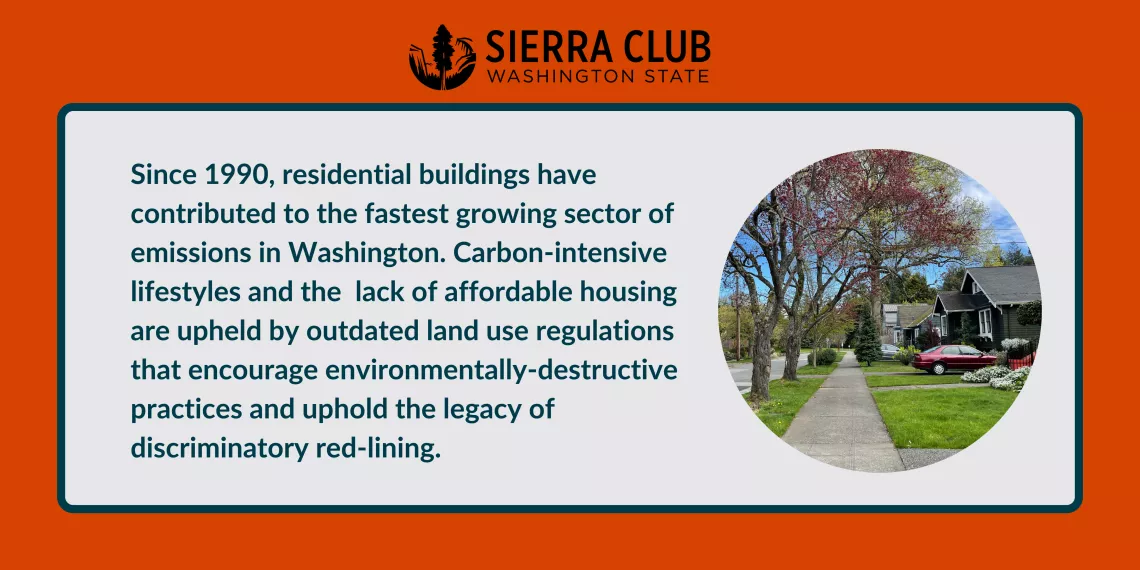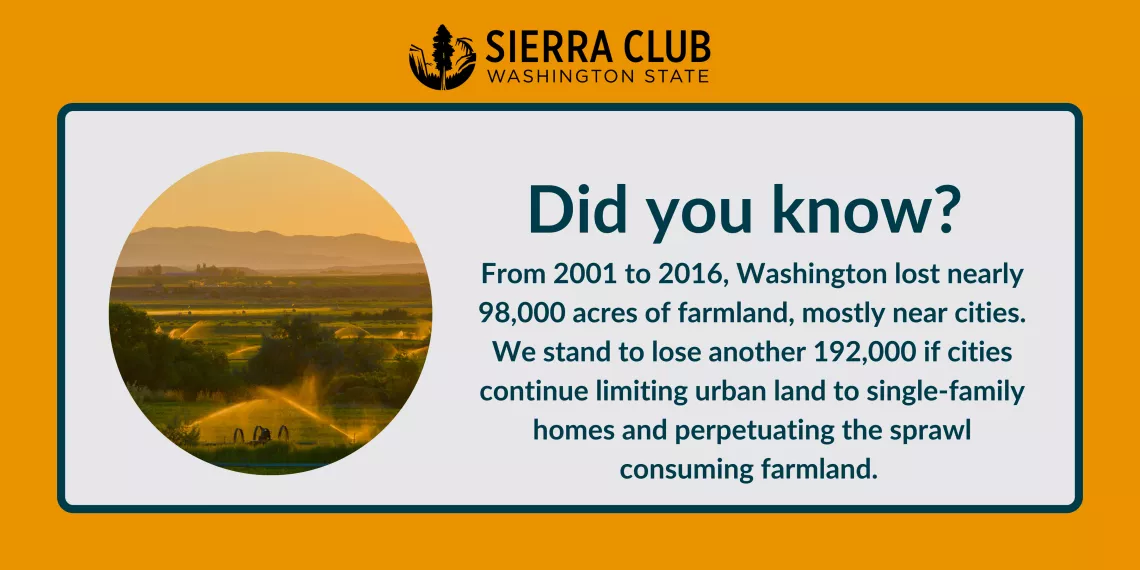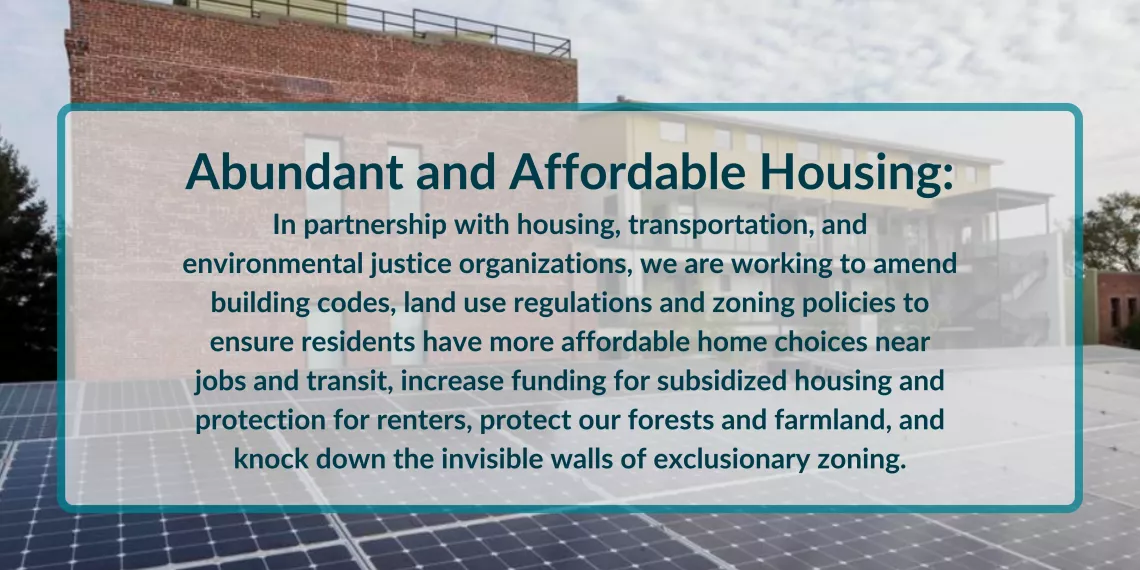Housing affordability is a matter of basic justice, equity, security, health, and economic opportunity for all. The severe housing shortage and affordability crisis facing Washington is hurting families and communities in every corner of the state. The interconnected, urgent problems of homelessness, housing insecurity, sprawl, and climate change pollution require us to act boldly and swiftly.
Since 1990, the buildings sector, both residential and business, is the fastest-growing emissions sector in Washington State, jumping 5x as much as other sectors since 1990. How, where, and what we build can decimate the climate.

Currently, our carbon-intensive lifestyles and lack of affordable housing are upheld by outdated land use regulations that encourage environmentally-destructive practices and uphold the legacy of discriminatory redlining.
These regulations often prohibit apartments, duplexes, townhomes, and accessory dwellings (i.e., “mother-in-law” suites) from being built, while encouraging the development of low-density, single, detached housing that - over the years - has led to increasingly larger and more expensive houses (i.e., “McMansions”). This financially inaccessible, low-density housing is harder to heat and typically uses enormous amounts of dirty fossil fuel (methane gas) to do so.
Housing doesn't operate on its own either. The proliferation of single-detached homes forces houses to spread out horizontally, or sprawl, pushing people further and further out of urban centers and our car-reliance and traffic grows. Sprawl, by nature, cuts into undeveloped agricultural and forest lands - turning them into strip malls and cul-de-sacs, while forcing us to drive more. Our lengthened commutes mean longer trips to work, grocery stores, doctors, and daycares - and thus even greater use of dirty fossil fuels (gasoline), adding to the climate crisis.
Additionally, beyond these newly converted lands simply having higher carbon emissions, when we encroach on farmlands and forested areas for low-density residential use, we lose the ability to sequester carbon from the atmosphere, while also releasing the very carbon that had been stored in the soil.
Did you know? More than 31 million acres of U.S. agricultural land have been irrevocably lost to sprawl since 1982.

Sprawling patterns of development not only jeopardize productive agricultural and forestry lands, they also put a huge strain on our local communities. We lose natural lands that support tourism and wildlife related industries. Our tax burdens increase due to more extensive public service construction and maintenance costs. Our health care costs increase due to pollution from automobile-centered neighborhood designs.
What we build and how we build it is inextricably linked to our environment. Housing is a key component to our strategy to combat the climate crisis. That’s why the Washington state Sierra Club is focusing on transforming our cities’ infrastructure to prioritize protecting our environment, our health, and our most vulnerable.

In partnership with housing, transportation, and environmental justice organizations under the Homes4WA coalition - we are working across the state to pass legislation to amend building codes, land use regulations, and zoning policies to ensure our fastest growing cities and municipalities can build abundant, dense housing in urban centers to limit sprawl and protect our treasured natural resources. Our policy solutions encompass three mutually reinforcing areas:
- STABILITY: More protections. Providing more assistance and stronger safeguards to keep people in their homes, protect renters from discrimination and eviction, support the unhoused, and protect Washington’s housing-insecure residents from homelessness.
- SUPPLY: More choices. Lift restrictions and ease cost and delays so Washington cities can add more homes of all shapes and sizes, so everyone has access to affordable and abundant housing, especially in urban areas near jobs, services, and transit.
- SUBSIDY: More funding. Increase our state’s investments in building affordable housing, in opening doors to homeownership and generational wealth-building, and protecting historically marginalized communities, to ensure that all Washingtonians have the opportunity to thrive in safe, healthy, affordable homes.
Homes4WA advocates are working together for affordable solutions for all Washingtonians: More protections, more choices, more housing funding. Together, we can:
- Ensure Washingtonians have more affordable home choices near jobs and transit by lifting rules preventing apartments, duplexes, townhomes, and accessory dwellings in our cities.
- Ensure safe and secure housing for all Washingtonians by increasing public funding for subsidized housing.
- Protect Washington’s forests, farmland, and open spaces by curbing sprawl and reducing carbon emissions.
- Provide more assistance and stronger safeguards to keep people in their homes and protect renters from discrimination and eviction.
- Allow more Washingtonians to age in place by accelerating the infill of accessible, affordable, convenient homes in our communities.
- Knock down the invisible walls of exclusionary zoning, taking steps to break the patterns of discriminatory redlining that continue to wall off access and opportunity and segregate our communities and school districts.